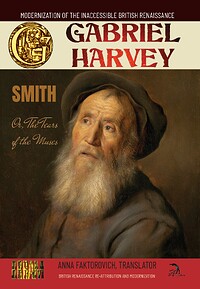Recensori in anteprima
A poetic satire of ghostwriters being hired to write puffery of and by patrons and sponsors, who pay to gain immortal fame for being “great”, while failing to perform any work to deserve any praise.
This volume shows the similarities across Gabriel Harvey’s poetic canon stretching from his critically-ignored self-attributed Smith (1578), his famous “Edmund Spenser”-bylined Fairy Queen (1590), and his semi-recognized “Samuel Brandon”-bylined Virtuous Octavia (1598). This close analysis of Smith is essential for explaining all of Harvey’s multi-bylined output because Smith is an extensive confession about Harvey’s ghostwriting process. Harvey’s Fairy Queen is his mature attempt at an extensive puffery of a monarch, which has been (as Harvey predicted in Smith and Ciceronianus) in return over-puffed as a “great” literary achievement by monarchy-conserving literary scholars across the past four hundred years. The relatively superior in its condensed social message and literary achievement Smith has been ignored in part because the subject of its puffery appears trivial from the perspective of national propaganda.
Smith: Or, The Tears of the Muses is a metered poetic composition that can also be performed as a multi-monologue play. The central formulaic structure is grounded in nine Cantos that are delivered by each of the nine Muses; this formula appeared in many British poems and interludes after its appearance in “Nicholas Grimald’s” translation of a “Virgil”-assigned poem called “The Muses” in Songs and Sonnets (1557). The repetitive nature of this puffing formula is subverted not only by the satirical and ironic contradictions that are mixed with the standard exaggerated flatteries of “Sir Thomas Smith” (Elizabeth’s Secretary), but also with several seemingly digressive sections that puff and satirize other bylines, including “Walter Mildmay” (King’s Councilor) and “John Wood” (“Smith’s” copyist and nephew). The central subject of the satire in Smith is Richard Verstegan’s career as a goldsmith, who forged antiques, and committed identity fraud that included ghostwriting books under multiple bylines, including passing himself (as Harvey points out) as at least two different “Sir Thomas Smiths”. The introduction to this volume includes matching handwritten letters that were written by Smith #1 (who died in 1577) and Smith #2 (who died in 1625) and by Verstegan under his own byline. In Smith’s conclusion, Verstegan responds with ridicule of his own directed at Harvey.
This is the first full translation of Smith from Latin into English. The accompanying introductory matter, extensive annotations, and class exercises hint at the many scholarly discoveries attainable by researchers who continue the exploration of this elegant work.
- Formato
- Ebook
- Generi
- Biography & Memoir, History, Poetry, Literature Studies and Criticism
- Offerto da
- Anaphora Literary Press (Editore)
(User: faktorovich) - Pacchetto
- Marzo 2023 Inizia il: 2023-03-01Termina il: 2023-03-27
- In vendita
- 2023-02-11
- Paesi
- Disponibile in tutti i paesi
- Collegamenti
- Informazioni sul libro
Pagina LibraryThing dell'opera

